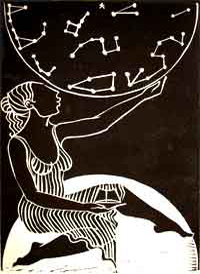

Geography/Culture: Greek, from the East. As a sur-title of Aphrodite, especially in Cythera.
Linguistic notes: perhaps from Greek ura `summer; the tail of lion, or bear, expressive of its fury'. The Egyptian ouraios, uraeus is formed from the same root. The element Ur- can also be connected with the `earth'. (Sources: IGEL 578; Graves WG.) An alternative fophoic rendering is: QR*NY1, which makes use of a British-English vowel, the gram for which is the redundant letter Q, generally unidentifiable to American-English speakers. It sounds like u in British-English lure.
Description: Mountain Goddess of summer, especially mid-summer; Ruler of the night sky; Mother earth; Queen of the winds. (Or) Goddess of earth, sea and air; She `Whose seat is in the heavens', (perhaps as Goddess of the moon). She eventually became one of the Mousae, Muse of astronomy and astrology.
To whom are sacred: heather; bees; oxen; the waving of feline tails expressive of anger [excitement, concentration]; lion; bear; bottom-joint of the fourth finger. As Goddess of earth, sea and air: the purple trade; {murex shell?}; swan; tortoise. When She became one of the Mousae: celestial globe; compass.
Titles, Variants, etc.
Sources: Encyc Brit v2 167-8; NLEM 118d; Graves WG 374; Kravitz WWGRM 159.
Description: Uranus is likely to have been not the father, but the mother, Ura-Ana, of the Titans.
Titles, Variants, etc.
Source: Graves WG 3374.
Geography/Culture: Celtic: Irish.
Linguistic notes: Related English word: Erica, the genus from Greek: ereike, `heath'.
Description: Goddess of mid-summer and passion.
To Whom are sacred: heather; bee; the colour-red; [heath and moor-land; heathens].
Titles, Variants, etc.